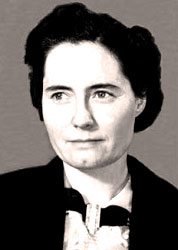
Gertrude E. Hendricks served as Director of the Family Life Education Department, a division of the Youngstown Public Schools, Coordinator of the Family Life Program, and Executive Secretary of the Family Life Council from 1947 to 1972.
In 1942 Gertrude Elizabeth (Peg) Hendricks accepted a position as a home economics teacher with the Youngstown Public Schools in Youngstown, Ohio. In addition to her teaching duties, her expertise and experience in the fields of parent education, family relations, child development and home management were used to develop school curriculum in first aid, home nursing, and child care.
The demand for women laborers in the war factories presented another opportunity for Gertrude Hendricks to use her education and experience. In May of 1942 she set- up and supervised day-care centers, after-school centers, and kindergartens to help working mothers. Three of the day-care centers operated on a twenty-four hour day, and two operated on a twelve hour day. Nine extended care centers opened before and after school hours. When the war ended in 1945, she went back to teaching high school home economics classes until 1947.
In 1947 the newly-established Family Life Council of Youngstown was looking for a fulltime director for a family life education program. This director would coordinate community-wide resources and develop educational programs to enrich and improve family living through adult education classes and workshops. Gertrude Hendricks accepted the full-time position as the director and coordinator. For the next twenty-five years she developed and coordinated a program of classes in parent education, family living education, and home management that served the entire community of Youngstown. This program was both dynamic and inclusive. Throughout the years the program reached thousands of parents and children in the community.
Her classes were created and revised to address the continually changing needs of families living in an urban, industrial city. Classes and workshops were offered in public and non-public schools, churches (all faiths), youth groups, community centers and welfare and social agencies.
In addition to family life education, Gertrude Hendricks developed and provided vocational training courses for child care aides and home assistants. Although all members of the family and community benefited directly and indirectly from the program, participants were predominately women with families. Therefore, many of the programs developed addressed several problems women faced as parents, homemakers, wives, and working mothers.
As early as 1951, the United States Office of Education sent out a bulletin to home economists to prepare women for the dual role of homemaker and worker.
“Homemakers In the Defense Program: Implications for Education in Home Economics”
Youngstown was a rapidly changing urban center dependent on the manufacture of steel. Continually changing demographics and erratic economic conditions challenged the family stability. After the war more women, especially married women, were working full-time outside the home than ever before. Study groups for parent education, vocational training, child care and development, home management, and consumer education helped women gain skills to provide economic support to their families as well as care for their physical and emotional needs. These workshops and study groups provided a supportive and sharing meeting place that promoted both self-confidence and self-enrichment. Helping families improve their life would be the central focus of Gertrude Hendricks’ work.
Gertrude’s son, Bob Hendricks and grandchildren remember their grandmother. Play video